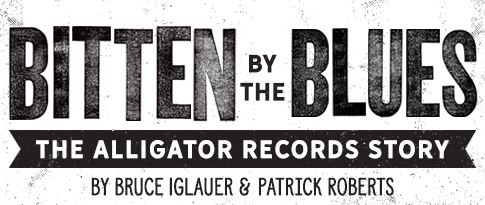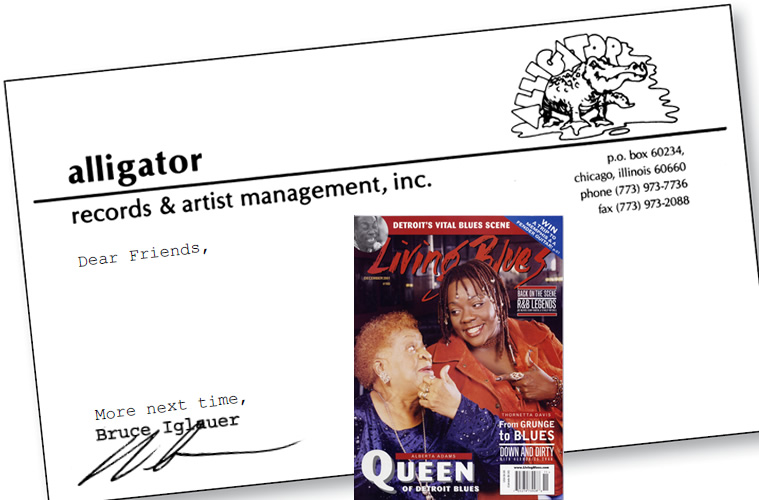Dear Friends,
In this time of emotional turbulence, it seems that we need the soul-soothing power of the blues more than ever. I’ve never considered blues to be just another form of musical entertainment; it was born out of pain, and I’m not the first person to call it ‘the healing music.’ During the last weeks the blues has been a great healer for me and for many of my friends. I hope it’s been helping you like it’s been helping me.
The Alligator Records 30th Anniversary Collection will be our last 2001 release. In January, 2002 you can look for the latest entries in our Deluxe Edition series, from two of the first artists on Alligator, Koko Taylor and Son Seals. Later in the year, expect new CDs from Little Charlie and the Nightcats, Lil’ Ed and the Blues Imperials, W.C. Clark (who comes to us after three outstanding albums on the much-missed Black Top label) and from our young sensation, Shemekia Copeland.
I was telling you last time about Lonnie Mack’s Alligator debut, 1985’s Strike Like Lightning. Soon after I shook hands with Lonnie on the making of an album, he uprooted from the Cincinnati area and, at the urging of his young fan and protégé, Stevie Ray Vaughan, moved to Spicewood, Texas, outside of Austin. Stevie envisioned that Lonnie would vault back into the national spotlight in his hometown, but Lonnie wasn’t one for going out to the clubs to jam. Instead he was living reclusively in a cabin out at a year-round fishing camp on the Colorado River. Meanwhile, Stevie was becoming a national sensation. Years before, Stevie and one of my long-time staffers, Mindy Giles, had become friends. It was Mindy who first talked to Stevie about producing Lonnie for Alligator. Stevie was completely into it; he figured that he could use his own name to bring his idol, Lonnie, back into the public eye. In November of 1985, about a year after Lonnie and I had shaken hands, I headed for Austin. Lonnie had booked time at Cedar Creek Studio, because he “liked the vibe,” and he had sent for his old friend (and former drummer) Gene Lawson to engineer. Lonnie told me that Levon Helm had committed to come in and play drums, and Lonnie’s brother Billy would play rhythm guitar as needed. For bass, Lonnie called in Tim Drummond, whose career had put him on the bandstand and in the studio with everyone from James Brown to Ry Cooder to Bob Dylan. And for keyboards, he invited Stan Szelest, a legendary player from Buffalo who had spent years with Ronnie Hawkins. Stevie would be coming into the project straight off a long tour, but that was the only time he had available.
I flew down to Austin nervously; I didn’t really know Lonnie that well, and the only other musicians that I had met were Stevie and Billy. It’s rare for me to walk into a recording situation with so little preparation; I’m a famous control freak, but Lonnie was insisting on being in charge. Unfortunately, I found out that Lonnie’s idea of being in charge often meant letting things flow a little too much. There was no rehearsal time scheduled; we were heading into the studio the day after I arrived. And it was when I arrived that I discovered that Levon had gotten a movie role and suddenly we had no drummer. So the first day in the studio was spent auditioning drummers while an irritated Gene Lawson desperately tried to get the talkback system working so that we could talk to the musicians through the headphones from the control room (it never did get working—so much for the good vibes of the studio). Unable to find a local drummer to Lonnie’s liking, we called Dennis O’Neal, Lonnie’s former road drummer from Ohio, and got him on a plane. At the end of the first day, almost nothing had been accomplished except that we were all frustrated and I had wasted a bunch of time and money. The only good thing was that Stevie and Lonnie had spent time swapping some equipment. Lonnie of course had his original 1958 Gibson Flying V, and Stevie brought his trademark Strats. Stevie introduced Lonnie to the Tube Screamer (one of the few pieces of outboard gear I’ve learned to like) and let Lonnie use one of his amps. But we were not off to a good start. Next time, how we snatched victory out of the jaws of defeat, and guest appearances by drunks, dogs and rattlesnakes!
Bruce Iglauer

